Running on LSD: My Mother’s Immigrant Story.
~1960s.
My mother immigrated from South Korea to the United States in her early 20s with her best friend from nursing school. There was a shortage of nurses here in the States back then and it seemed that visas for nursing school graduates were being handed out like raffles at the corner store. Omma arrived in the “land of dreams” with whatever clothes she could stuff into a duffel bag, the money she’d been saving up that past year in Korea, and the small roll of ₩ her father had handed to her the morning she left.
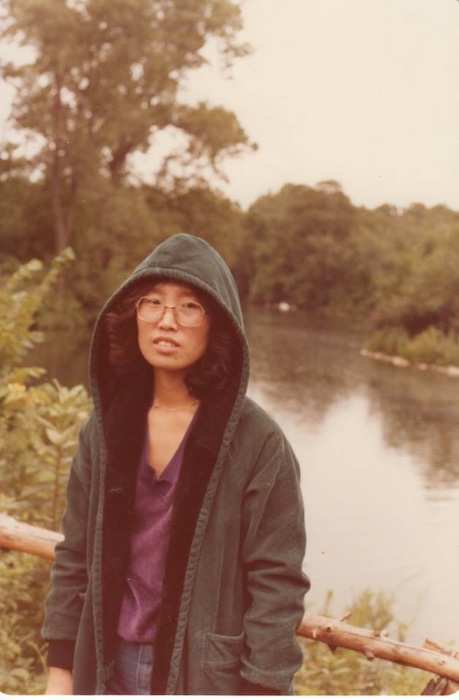
With that roll of money, though, he handed to her something she would carry for the rest of her life. Her father, sweet, gentle, and painfully kind, loved her best out of his 5 daughters and 1 youngest son. After watching her parents bury three babies in three winters in their backyard, she offered herself to her father, she was to be the self-appointed “son,” despite being the wrong gender. While the rest of her family would remain behind on the farm each summer, her father would take her into town, groom her as though she were the eldest son instead of the second eldest daughter. He would never say so out loud, but my mother knew: “With this money, I’m taking not just my own hopes and dreams to the alleys of America, I’m taking all of theirs, too.”
Aiming to secure a position at Cook County Hospital here in Chicago while studying for her Boards, she and her best friend rented a one-bedroom flat for 99 bucks a month up in Rogers Park. Small, cramped and rife with code violations, my mother recalls how she and her best friend slept with all their appendages firmly within the confines of their one full size bed, to avoid whatever it was that made the scurrying sounds on their creaking wooden floors every night.
My mother took French in middle school and high school. Beyond a handful of conversational phrases (“merci beaucoup”), that part of her brain might as well have been lobotomized. Picking up languages has never been her forte and English was (as she still describes it) an accursedly inconsistent tongue (“wolves” for “wolf” but “roofs” for “roof”???). Attempting to pass the nursing exams was itself a challenge, but doing so in a language with which she was only superficially familiar was a lot like trying to navigate the Grand Canyon with nothing but an old compass and a blanket of stars.
Omma did love looking up at the stars, though. Her “home” (she still calls Korea her home) consisted of a small farm guarded by blue-grey mountains and forests of thick green pines. The stars were so clear each night, she could almost reach out, pick them out of the darkness, and hold them. Chicago, on the other hand, with its hulking feats of steel and glass, the endless pairs of eyes glimmering from traffic, even the moonlight that reflected off the back of the silver snake that wound its way throughout the city at all hours — all these lights drowned out the prospect of stargazing.
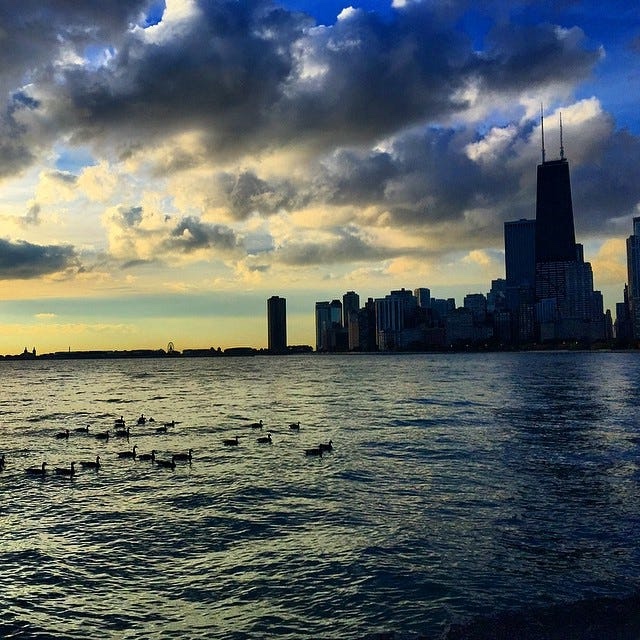
So, in lieu of looking up, my mother looked down — at the Lake. Like no “lake” she’d ever seen back home, Lake Michigan extended beyond the horizon. She’d never lived so close to such a large body of water and the notion that it was clean enough to supply the city’s drinking water intrigued her. She found herself wandering over to Lake Shore Drive often, after a grueling session hitting the books, when she was hungry and didn’t have money to eat, when she was bored and was not in the mood to talk to her roommate, simply to watch the foam curling up onto the shore like a furtive but welcoming smile.
You will never meet a woman more hard working than my mother. 40 years into a successful nursing career, and she still takes on the 11 p.m. to 3 a.m. night shift when no one else can — not because she needs the cash, but because that’s just what needs to get done. She poured over those books each night until the Roman letters swam together like a family of crawling ants and the hunger pangs she couldn’t quite satisfy shrouded her wits in fog. But what good is remembering something you can’t understand? The language barrier proved too tall for my 5 foot-nothing mom.
On the afternoon of the test results, she called her father on the payphone around the corner from their apartment. Though, normally, she didn’t like to cry in front of anyone — least of all her parents — she couldn’t help herself.
“Daddy, I failed.”
I can hardly think of any combination of three words in any language that is more heartbreaking, more humiliating, than the one my mom uttered into the payphone that afternoon. She thought of the roll of money her father had handed to her on the day she left for the States, how she had spent almost all of it with the assumption — the presumption — that she would pass her exams and secure a full-time job shortly thereafter to pay for her rent, a pair of new shoes, and, eventually, an airplane ticket for her father. She would have to return home, her cool hands empty but for the bitter residue of failure.
Her father comforted his No. 2 daughter the best he could through the static of an international phone call and my mother’s brokenness, and told her that she was not a failure, that of course she could come home. But then, he said something she didn’t expect to hear:
“But, Sunny… If you come home now, you might regret it for the rest of your life.”
Tough words to hear and certainly tougher words to say to a 20-something year old with nothing but the couple dollars she fingered in her right coat pocket to her name. Omma hung up the phone feeling nothing so much as the weight of her father’s words hurtling down her back as she turned east, towards the Lake.
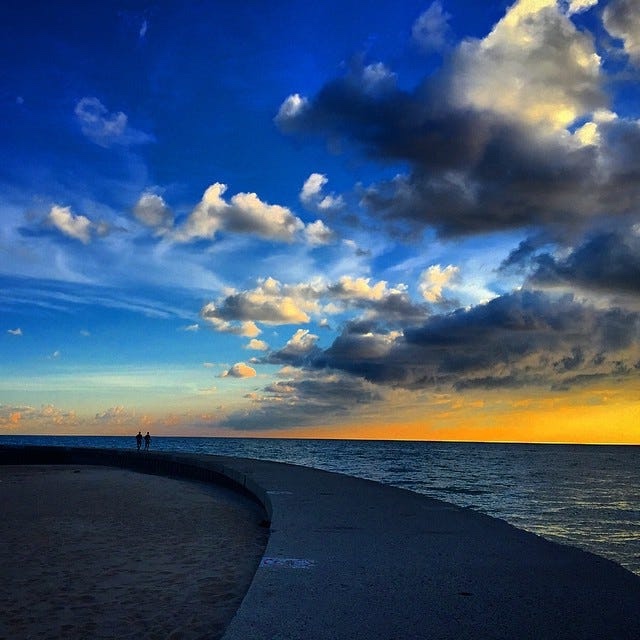
It was a typical winter day in Chicago — impossibly sunny while being brutally cold. There were few people brave enough to face the biting wind that hurled off the lakeshore, like pages being ripped from a book. Omma, both hands in her pocket, stepped one foot in front of the other along the lakeshore trail, wondering where she could gather the funds to survive another round of exams and even if she could scale that impossible hurdle, how she could pass them when she’d already failed.
Slowly, a figure began to emerge from the periphery. A small, old homeless woman, her frail body stooped in submission to the cold as she continued to tread towards her. Gripping the handful of quarters, dimes and nickels she had in her right pocket, Omma rounded her narrow shoulders and watched the toes of her shoes, as they sidled closer and closer to the edge of the Lake. She had no money to give away and wanted to avoid the inevitable entreaty that appeared determined to cross her shadow that day.
Sure enough, a pair of wrinkled upturned hands were shoved underneath my mother’s nose. She had no choice but to look up then. The beggar lady was short, but still a little taller than Omma. Her skin was haggard and as white as the foam trapped beneath the ice, framed by gritty strands of grey hair. So cold, but all she had on was a light spring jacket.
“Ma’am, do you have a dollar for a cup of coffee? It’s so cold,” she inquired in perfect American English.
Eventually, my mother would learn to employ the second most powerful word in the English language: “No.” But on that day, for whatever reason, even though the loose change that was starting to get slick with sweat in her right coat pocket was virtually all the money she had left at that moment, she said the other:
“Yes.”
She pulled her hand out of her pocket and poured the change right into the wrinkled palms, which were beginning to turn red. The air was unforgiving and Omma started to bring her hand back to the warmth of her coat pocket, but not before the old lady snatched it up into her own. They were so so cold. She tried to pull away, to yank her hand back to safety, she began to tell the beggar that it was okay, she didn’t need effusive demonstrations of gratitude with the few English words she could bring to her chapped lips.
But the old wrinkled lady didn’t say “thank you” or “god bless” or “have a lovely day,” as she imprisoned my mother’s hand that afternoon. She said something else — something that my mother would never forget. Something that she would one day repeat to her American daughter:
“You’re going to pass that test.”
presently.
Four more blocks down Lake Shore Drive (“LSD”) before I’d cross the mental finish line: Erie, Ontario, Ohio, and then Grand Avenue. My thighs were burning and the hole in my stomach threatened to spill out of me and onto the pavement with each step. I could have stopped then, I could have even stopped a mile earlier, but numbers are important to me and it was absolutely imperative that however long it took, I logged at least 17 miles this morning. So, four more blocks eventually became two whittled down to one and then, finally, I was bent over, holding my chest so as not to have my lungs splatter into the tiled floors of my building’s lobby.
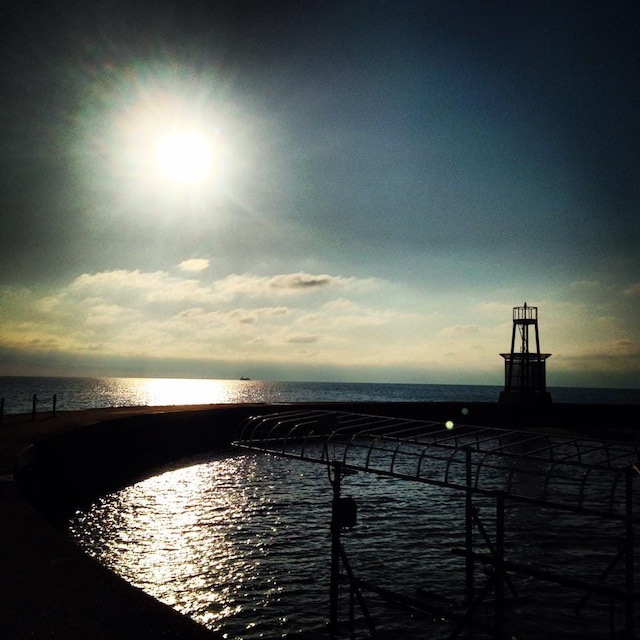
Every week, I hear some version of the statement “how lucky we are to have one of the most awesome running trails in the country.” I agree. Lake Shore Drive is show-stopping in the sun, hauntingly lovely in the mist, and sexy with its amber glow at night. When I finally decided to move out of the burbs and into the city, it was not a coincidence that I ended up walking distance from the same Lake that my mother used to visit so frequently during her earliest days here in the States. I’m not superstitious and I’m still not sure if I believe in God, but I do believe in my mother and I thought that whatever strength she drew from the Lake, whatever magic seeped into the shore, perhaps some reservoir of it remained for me.
I used to hate running. I only started running along LSD to lose weight. It was a purely functional activity — I didn’t run for some of the reasons other people talked about, to “clear my head,” to “relieve stress,” to “feel great!” I hated running so much, I could actually feel my stress levels climb with each pump of the legs, as I constantly checked my watch to see how not-far I’d come.
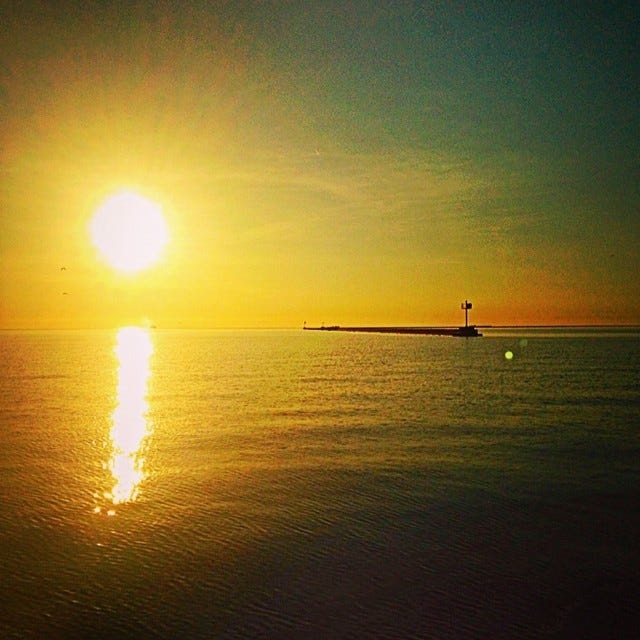
But, with the “most awesome running trail” basically a stone’s throw away, I started running this past summer, once a week, a few miles on Saturday morning. I’d take pictures of the Lake, the sun bursting over the water like a fluorescent egg yolk, the misted cityscape hovering like the dreams I left behind each morning on my pillow. I rarely listened to music when I ran. It was summer and I enjoyed the thrush and sighs heaving into the shore, just inches from my feet. It reminded me just how far away I was from the life I once lived, how much closer I was to the life my mother once started, right here, in the same place.
Within a few months of my “virgin” run along the lakefront, I ran from my apartment all the way to Hyde Park (where I went to law school), almost entirely along LSD. I left my front door at around 6:20 in the morning, when this side of the world was still veiled in the thick opiate of dreams. Though the distance was intimidating, there was something unspeakably beautiful in the sound of my feet hitting the ground. It was just me, the fog, and the trail winding out in front of me. To my right, Lake Shore Drive was quiet; only a few cars would round the curve every few minutes. To my left, though, the Lake launched itself against the rocks, cleaving to the shore as though trying to penetrate the fog, the sand, the cement, my running shoes, my heart.
It was, in fact, the perfect setting to meet an old beggar lady, one who would hand to me all my dreams come true in a brown paper bag in exchange for the AMEX card I slipped into my shoe that morning. But in all 9.34 miles I ran that day, no wrinkled fairy godmother appeared to bring my heartbeat to a boil. What “test” was I aiming to pass, anyway? There was no do-or-die moment looming over me — I had made it: I lived in one of the nicest parts of the city, had a great job, a loving family, two happy dogs, and a body that, by then, attracted enough attention to satisfy even Scarlett O’Hara.
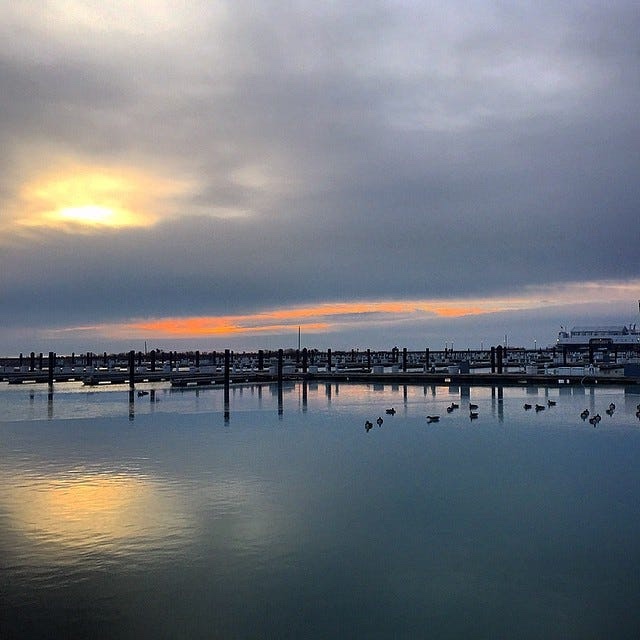
I would soon learn that “failure” can often disguise itself as success. Or, perhaps more accurately, sometimes, “success” can cost too much. In less than a week, I’ll be running my first marathon. To those who have asked me whether I’m “excited,” my retort is, “Would you be excited about running 26.2 miles? No? I didn’t think so.”
The truth is, I’m terrified of failing, that I will somehow peter at our mile 22 or end up walking the last 3 miles. I realize, now, that marathon running is like anything else–fraught with both triumph and doubt. I consider all of the times I stepped forward with no guarantee of success, when no one–not even an old beggar lady on the street–had faith in me.
This morning, each step forward was an uprooting, the pavement trying to keep me tethered to all the doubts that have been clawing at me:
“You’re just not light enough,”
“You’re just not fast enough,”
“You’re just not strong enough,” and
“You’ll always be alone.”
I felt the wind trying to pick me up and cradle me against the shore, and I almost let it.
But I didn’t want to have to pick up the phone and say,
“Omma, I failed.”
Luckily, the sound of my feet hitting the ground… it told me something:
“You’re going to finish that race.”


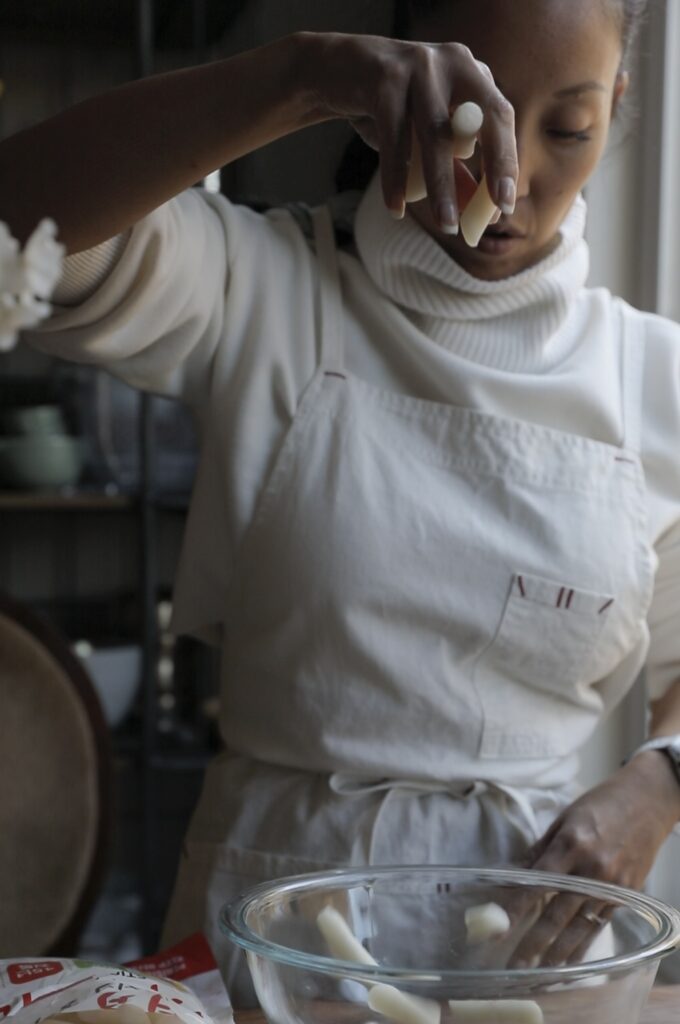



You write beautifully. If you wrote books I would buy all of them. I teared up a bit at the phone call part. Your mother was a brave lady and so are you . I am half way through my own weight loss program and at the beginning I was miserable and depressed but I made up my mind to enjoy the experience and i am now truly enjoying cooking healthier versions of meals and taking care of myself . I hope there’s a part 2 to her story. 🙂
Wow, Vannda, that means so much to me. Congrats to you on changing your PoV on weight loss!! Remember: being healthy doesn’t mean you can’t eat delicious foods. I try to make a point of it to include something I WANT to eat in every single meal!
Even though I am also the daughter of Korean immigrants, this spoke to me on so many levels beyond that parallel. I keep coming back and re-reading this post. Thank you for sharing this.
Thank you so much Frances. I’m so glad this resonated with you. <3
Greetings I am so delighted I found your blog, I really found you by mistake, while I was researching on Askjeeve for something else,
Anyhow I am here now and would just like to say kudos for a marvelous post and
a all round enjoyable blog (I also love the theme/design), I don’t have
time to read it all at the moment but I have saved it and
also included your RSS feeds, so when I have time I will be back to read much more, Please do keep up the superb work.
thank you so much College hoodie! What an awesome “mistake” that led you to my little corner. Thank you for the kind words and I’m so glad you enjoy the things here. Best of luck with whatever it is you WERE looking for with Askjeeve!